届高三一轮复习英语第一册精品教案(20)
高三英语复习教案(15篇)
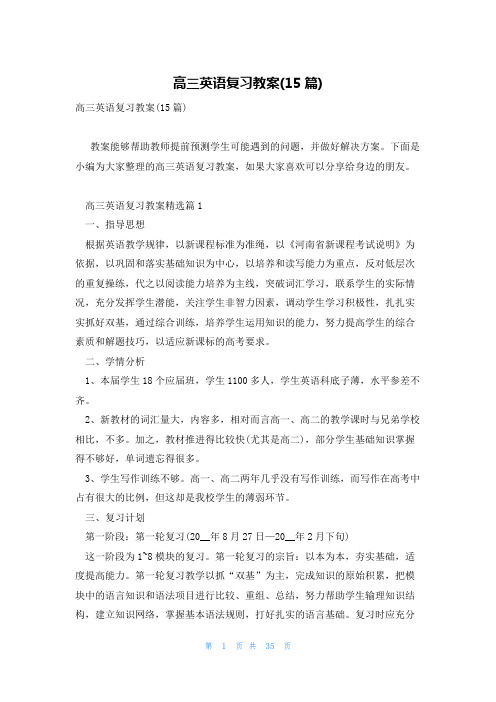
高三英语复习教案(15篇)高三英语复习教案(15篇)教案能够帮助教师提前预测学生可能遇到的问题,并做好解决方案。
下面是小编为大家整理的高三英语复习教案,如果大家喜欢可以分享给身边的朋友。
高三英语复习教案精选篇1一、指导思想根据英语教学规律,以新课程标准为准绳,以《河南省新课程考试说明》为依据,以巩固和落实基础知识为中心,以培养和读写能力为重点,反对低层次的重复操练,代之以阅读能力培养为主线,突破词汇学习,联系学生的实际情况,充分发挥学生潜能,关注学生非智力因素,调动学生学习积极性,扎扎实实抓好双基,通过综合训练,培养学生运用知识的能力,努力提高学生的综合素质和解题技巧,以适应新课标的高考要求。
二、学情分析1、本届学生18个应届班,学生1100多人,学生英语科底子薄,水平参差不齐。
2、新教材的词汇量大,内容多,相对而言高一、高二的教学课时与兄弟学校相比,不多。
加之,教材推进得比较快(尤其是高二),部分学生基础知识掌握得不够好,单词遗忘得很多。
3、学生写作训练不够。
高一、高二两年几乎没有写作训练,而写作在高考中占有很大的比例,但这却是我校学生的薄弱环节。
三、复习计划第一阶段:第一轮复习(20__年8月27日—20__年2月下旬)这一阶段为1~8模块的复习。
第一轮复习的宗旨:以本为本,夯实基础,适度提高能力。
第一轮复习教学以抓“双基”为主,完成知识的原始积累,把模块中的语言知识和语法项目进行比较、重组、总结,努力帮助学生输理知识结构,建立知识网络,掌握基本语法规则,打好扎实的语言基础。
复习时应充分发挥学生的主体作用。
精选一轮复习资料,一单元一案,每单元4x5课时,每周一次拓展练习。
注重阅读训练,2—3篇/日;强化书面表达训练,1篇/周(25分钟左右);书面表达常用的词、短语、句子记录背诵。
每天有一定量的词汇要求学生记忆,保证学生早、晚每次10分钟,重复记忆(要背诵的词、短语、句子列在平时的练习中)。
计划至20__年2月下旬结束第一轮复习。
近年高考英语一轮复习 专题20 七选五教学案(2021年最新整理)

(课标通用)2017高考英语一轮复习专题20 七选五教学案编辑整理:尊敬的读者朋友们:这里是精品文档编辑中心,本文档内容是由我和我的同事精心编辑整理后发布的,发布之前我们对文中内容进行仔细校对,但是难免会有疏漏的地方,但是任然希望((课标通用)2017高考英语一轮复习专题20 七选五教学案)的内容能够给您的工作和学习带来便利。
同时也真诚的希望收到您的建议和反馈,这将是我们进步的源泉,前进的动力。
本文可编辑可修改,如果觉得对您有帮助请收藏以便随时查阅,最后祝您生活愉快业绩进步,以下为(课标通用)2017高考英语一轮复习专题20 七选五教学案的全部内容。
专题20 七选五考纲展示命题探究1 命题方式的特点(1)题型特点从题型和选项内容我们可以归纳出选项可分为三种类型:①主旨概括(文章整体内容);②过渡性句子(文章结构);③注释性句子(上下文逻辑意义)。
其多余的两个干扰项也往往从这三方面进行设置,如主旨概括句或过于宽泛或以偏概全或偏离主题,过渡性句子不能反映文章的行文结构,注释性句子与上文脱节等.(2)语篇结构分析篇章结构,把握全篇文脉是七选五解题的关键。
分析文章的层次包含两种形式:一种是分析整篇文章的层次,也就是段落,另一种是分析每一个段落内部的层次,也就是语篇层次。
语段与段落是有区别的,语段是篇章结构的中间层次,是由句子到篇的一种过渡形式,段落是在某些语体(如记叙文、议论文)中比语段更大的意义单位,较小的段落可以只包括一个语段或一个句子,一般来说,一个段落通常由几个语段构成.构成语段的方式有两种,一是靠句与句意义的结合,二是靠句与句的关联词、逻辑性插入语来连接,在分析语段层次时,可以借助句与句的连接词语作出判断,但最主要的还是要真正体会句与句的意义关系,把握作者的思路,从语序上去发现断续点,理清层次。
好文章的层次非常清晰,只有层层入手,才能真正理解文章.2 选项的特点(1)正确项特点:主旨概括准确、上下文无缝衔接、注释与说明正确。
全国统考2022届高考英语一轮复习选修11Unit3Thesecretofsuccess讲义教案20

Unit 3 The secret of success主题: 人与自我子话题: 成功的秘密对应教材: 选修11 Unit 3 The secret of successⅠ. 细品味经典文章SuccessThere are no secret of success. Success is doing the things you know you should do. Success is not doing the things you know you should not do.Success is not limited to any one area of your life. It enpasses all of the facets of your relationships: as parent, as wife or husband, as citizen, neighbour, worker, and all of the others.Success is not confined to any one part of your personality but is related to the development of all the parts: body, mind, heart, and spirit. It is making the most of your total self.Success is discovering your best talents, skills, and abilities and applying them where they will make the most effective contribution to your fellow men.Success is focusing the full power of all you are on what you have a burning desire to achieve.Success is ninety-nine percent mental attitude. It calls for love, joy, optimism, confidence, serenity, poise, faith, courage, cheerfulness, imagination, initiative, tolerance, honesty, humility, patience, and enthusiasm.Success is not arriving at the summit of a mountain as a final destination. It is a continuing upward spiral progress. It is a perpetual growth.Success is having the courage to meet failure without being defeated. It is refusing to let present loss interfere with your long-range goal.Success is accepting the challenge of the difficult. In the inspiring words of Philips Brooks: “Do not pray for tasks equal to your powers. Pray for powers equal to your tasks. Then the doing of your work shall be no miracle, but you shall be the miracle. ”Ⅱ. 按要求完成任务1. 写出与本话题有关的词汇optimism, confidence, serenity, poise, faith, courage, cheerfulness, imagination, initiative, tolerance, honesty, humility, patience, enthusiasm2. 你认为如何才能取得成功呢?To succeed, one should be confident, persistent and patient. We can’t lose heart in face of difficulty and work hard to overe it.1. improvement n. 改进, 改善【教材原句】I have been mayor for three years, and I have made many improvements for the people of the city. (P33)我当市长三年了, 使这个市里的市民生活大有改善。
高三英语一轮复习9月教案(20个)

课时教案课时教案课时教案课时教案课时教案课时教案课时教案课时教案课时教案课时教案课时教案课时教案课时教案课时教案almost as cheap as chip cards, the card readers are expensive.Types (3)________________ DisadvantagesIC Chip Cards A larger memory &Better (4)___________Hold dataNot mentionedOptical (2)___________cards Store much dataGood for (5)_________Drivers and (6)_______to keep records(7)_______ not much(8)________ dataNo processorsExpensive card(9)___________Writing下面的饼状图(pie chat)显示了你对你校学生兴趣爱好的调查结果。
请你用英语给Shanghai Students’ Post 写一篇短文,报道你的调查结果,并对此结果发表你的看法或建议。
字数120词左右。
首句已给出(不计入词数)。
A recent survey shows what the students of our school like to do in their spare time.课后作业:教学反思:课时教案课时教案课时教案课时教案课时教案课时教案。
高三英语一轮复习教案
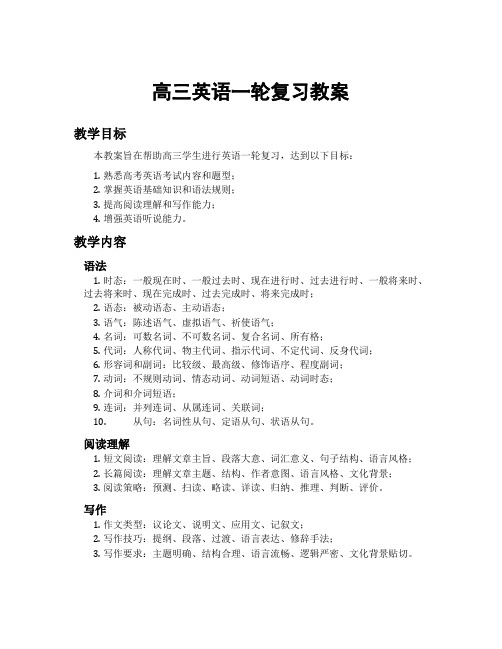
高三英语一轮复习教案教学目标本教案旨在帮助高三学生进行英语一轮复习,达到以下目标:1.熟悉高考英语考试内容和题型;2.掌握英语基础知识和语法规则;3.提高阅读理解和写作能力;4.增强英语听说能力。
教学内容语法1.时态:一般现在时、一般过去时、现在进行时、过去进行时、一般将来时、过去将来时、现在完成时、过去完成时、将来完成时;2.语态:被动语态、主动语态;3.语气:陈述语气、虚拟语气、祈使语气;4.名词:可数名词、不可数名词、复合名词、所有格;5.代词:人称代词、物主代词、指示代词、不定代词、反身代词;6.形容词和副词:比较级、最高级、修饰语序、程度副词;7.动词:不规则动词、情态动词、动词短语、动词时态;8.介词和介词短语;9.连词:并列连词、从属连词、关联词;10.从句:名词性从句、定语从句、状语从句。
阅读理解1.短文阅读:理解文章主旨、段落大意、词汇意义、句子结构、语言风格;2.长篇阅读:理解文章主题、结构、作者意图、语言风格、文化背景;3.阅读策略:预测、扫读、略读、详读、归纳、推理、判断、评价。
写作1.作文类型:议论文、说明文、应用文、记叙文;2.写作技巧:提纲、段落、过渡、语言表达、修辞手法;3.写作要求:主题明确、结构合理、语言流畅、逻辑严密、文化背景贴切。
听力和口语1.听力技巧:预测、听懂关键词、听懂上下文、听懂语调、听懂语气;2.口语技巧:发音、语调、语速、语言表达、交际能力;3.听力和口语训练:听力材料、口语练习、听说结合、模仿练习。
教学方法1.讲授法:通过讲解语法规则、阅读理解技巧、写作技巧等知识点,帮助学生掌握英语基础知识;2.练习法:通过练习题目,帮助学生巩固所学知识,提高应试能力;3.互动法:通过小组讨论、角色扮演、口语练习等活动,增强学生的英语听说能力和交际能力;4.自主学习法:通过给学生提供英语学习资源,如英语学习网站、英语学习软件等,鼓励学生自主学习和探索。
教学计划第一周1.语法:时态、语态、语气;2.阅读理解:短文阅读;3.写作:议论文写作;4.听力和口语:听力技巧。
高三一轮复习英语教案2022

高三一轮复习英语教案高三一轮复习英语教案2022作为一名教职工,就有可能用到教案,教案是保证教学取得成功、提高教学质量的基本条件。
那么写教案需要注意哪些问题呢?以下是小编精心整理的高三一轮复习英语教案2022,欢迎大家分享。
高三一轮复习英语教案20221一.教学内容分析本单元的中心话题是Good manners,这是一个亘古及今且永恒的话题。
但在我们这一单元中,Good manners 都有些什么内容呢?中外文化中对Good manners 的理解、体现有什么异同?我们该怎么做、做什么才能成为一个受人欢迎、具有Good manners 的人呢?单元中十一个板块的相关话题的设计及语言材料的选编无不紧紧扣着这个中心。
从日常生活中看似虽小但能触及心灵的情景及行为,如道歉、书面致谢;东西方餐桌礼仪;域外风俗礼节等,都作了详尽的诠释,所有这些为我们提供的不仅是充实的英语语言知识和综合语言运用技能训练的内容,更重要的是学生学习这一单元的整个过程也是他们陶冶情操、规范行为、发展心智的过程,这对他们身心的发展会产生较强的感染作用,有助于他们人文素养的整体提高和跨文化意识的加强。
“热身”(Warming up)部分设计了学生学习生活中及日常生活中经常发生的四幅画面:上课迟到、打断别人说话、排队买饭时不小心雨伞戳着别人、商店里排队付款一男士推开两顾客从他们中间穿过,顾客生气质问男士。
让学生学会道歉,学会讲礼貌。
这部分的目的是,引出中心话题Good manners,帮助学生明白讲礼貌会使我们人际之间关系和谐融洽,甚至会化干戈为玉帛;同时复习或学习一些致歉语和必要的答语。
“听力”(Listening)部分提供了一段两朋友间的对话,一朋友不打招呼骑走了另一朋友的自行车,并且把它弄丢了。
怎么办?当然是道歉。
这个听力练习要求学生通过听学会对发生了这种事情后的道歉表达和更高姿态的回响,使道歉者释然。
以此了解英语国家人士语言的得体性、思维的方式与习惯表达方法,培养学生跨文化交际的意识。
高三英语一轮备课教案设计
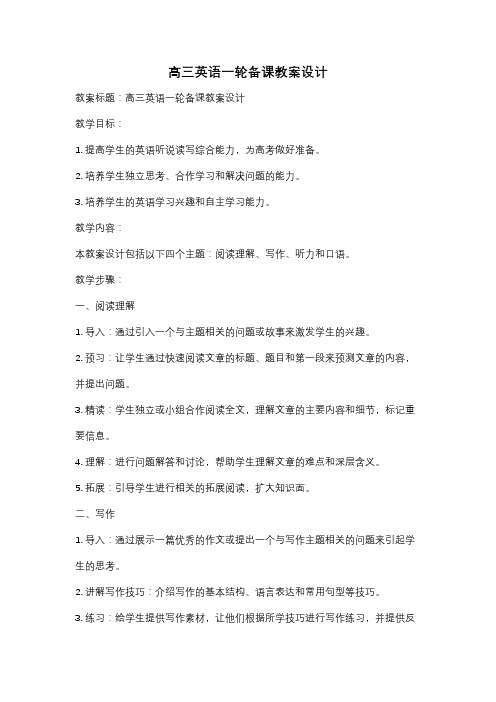
高三英语一轮备课教案设计教案标题:高三英语一轮备课教案设计教学目标:1. 提高学生的英语听说读写综合能力,为高考做好准备。
2. 培养学生独立思考、合作学习和解决问题的能力。
3. 培养学生的英语学习兴趣和自主学习能力。
教学内容:本教案设计包括以下四个主题:阅读理解、写作、听力和口语。
教学步骤:一、阅读理解1. 导入:通过引入一个与主题相关的问题或故事来激发学生的兴趣。
2. 预习:让学生通过快速阅读文章的标题、题目和第一段来预测文章的内容,并提出问题。
3. 精读:学生独立或小组合作阅读全文,理解文章的主要内容和细节,标记重要信息。
4. 理解:进行问题解答和讨论,帮助学生理解文章的难点和深层含义。
5. 拓展:引导学生进行相关的拓展阅读,扩大知识面。
二、写作1. 导入:通过展示一篇优秀的作文或提出一个与写作主题相关的问题来引起学生的思考。
2. 讲解写作技巧:介绍写作的基本结构、语言表达和常用句型等技巧。
3. 练习:给学生提供写作素材,让他们根据所学技巧进行写作练习,并提供反馈和指导。
4. 互评和修改:学生交换作文,进行互评和修改,提出改进意见,并给予积极的反馈。
三、听力1. 导入:通过播放一段与听力主题相关的音频或提出一个问题来激发学生的兴趣。
2. 听力训练:给学生提供一系列听力练习,包括听对话、短文和新闻等,让他们提高听力理解能力。
3. 理解:通过问题解答和讨论,帮助学生理解听力材料的主要内容和细节。
4. 听力技巧:讲解听力技巧,如捕捉关键词、注意听力材料的上下文等。
四、口语1. 导入:通过展示一段与口语主题相关的视频或提出一个问题来引起学生的思考。
2. 对话练习:给学生提供一些常见的口语情景,让他们进行对话练习,提高口语表达能力。
3. 角色扮演:学生分组进行角色扮演,模拟真实情景,提高口语交流和应对能力。
4. 反馈和指导:给予学生积极的反馈和指导,帮助他们改进口语表达和交流能力。
教学评估:1. 在每个教学环节结束时进行小组或个人评估,包括对学生的理解程度、参与度和表现进行评价。
2020版高考英语一轮复习第1部分Module1MyFirstDayatSeniorHigh教学案(含解析)外研版
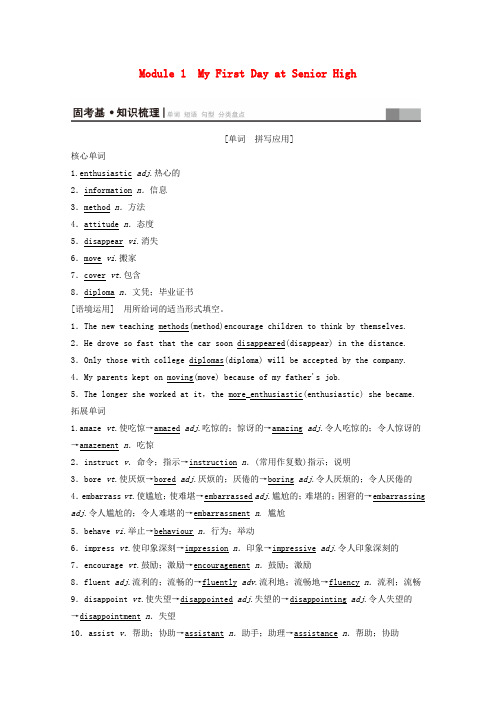
Module 1 My First Day at Senior High[单词拼写应用]核心单词1.enthusiastic adj.热心的2.information n.信息3.method n.方法4.attitude n.态度5.disappear vi.消失6.move vi.搬家7.cover vt.包含8.diploma n.文凭;毕业证书[语境运用] 用所给词的适当形式填空。
1.The new teaching methods(method)encourage children to think by themselves. 2.He drove so fast that the car soon disappeared(disappear) in the distance. 3.Only those with college diplomas(diploma) will be accepted by the company. 4.My parents kept on moving(move) because of my father's job.5.The longer she worked at it,the more_enthusiastic(enthusiastic) she became. 拓展单词1.amaze vt.使吃惊→amazed adj.吃惊的;惊讶的→amazing adj.令人吃惊的;令人惊讶的→amazement n.吃惊2.instruct v.命令;指示→instruction n.(常用作复数)指示;说明3.bore vt.使厌烦→bored adj.厌烦的;厌倦的→boring adj.令人厌烦的;令人厌倦的4.embarrass vt.使尴尬;使难堪→embarrassed adj.尴尬的;难堪的;困窘的→embarrassing adj.令人尴尬的;令人难堪的→embarrassment n. 尴尬5.behave vi.举止→behaviour n.行为;举动6.impress vt.使印象深刻→impression n.印象→impressive adj.令人印象深刻的7.encourage vt.鼓励;激励→encouragement n.鼓励;激励8.fluent adj.流利的;流畅的→fluently adv.流利地;流畅地→fluency n.流利;流畅9.disappoint vt.使失望→disappointed adj.失望的→disappointing adj.令人失望的→disappointment n.失望10.assist v.帮助;协助→assistant n.助手;助理→assistance n.帮助;协助[语境运用] 用所给词的适当形式填空。
高三英语一轮复习教案5篇
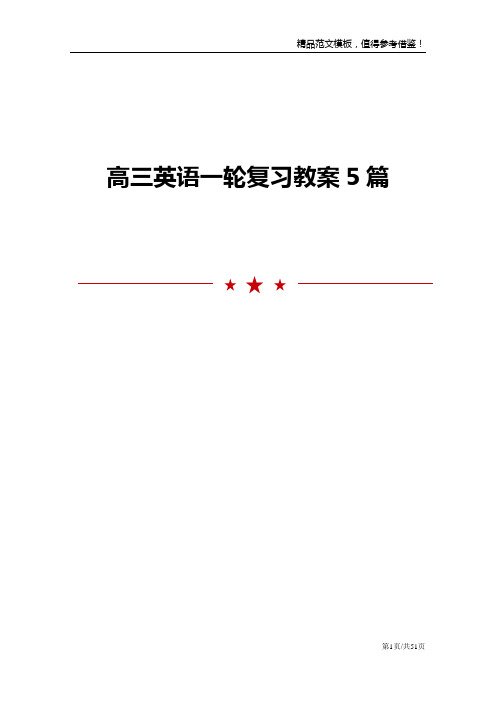
高三英语一轮复习教案5篇高三英语一轮复习教案5篇教学计划是教学活动得以顺利进行的基本保证。
好的教学设计可以为教学活动提供科学的行动纲领,使教师在教学工作中事半功倍,取得良好的教学效果。
以下是带来的高三英语一轮复习教案内容,感谢您的阅读,希望能帮助到您!高三英语一轮复习教案1高考是以考查学生英语运用能力为主的。
高考英语试题基本上是一套能力测试题。
目前高考英语试题在重视英语基础知识的同时,突出考查语言运用能力,形成了以篇章阅读为主体的试题布局。
高考复习首先要明确复习目的,理清思路。
高三复习的过程不应是对已学知识的简单重复和强化,而是一个再学习、再认识、提高理解能力和运用能力的过程。
高三复习的最终目的是提高学生的语言运用能力,如果还是按照传统的串讲课文的方法进行复习,在这么短的时间内达到复习目的是不可能的,因为语言运用能力只-串讲课文是培养不出来的,特别是阅读能力。
因此,在短暂的高考复习中兼顾语言知识的掌握和语言能力的培养是值得广大教师认真探讨的课题。
针对高考英语侧重考察考生的语言和理解能力的显著特点,如何制定出一套较好的科学的英语复习方案,在最后的几个月时间里尽量提高学生英语语言的运用能力成了大家甚为关注的问题,也常常是大家话题讨论的焦点。
本文主要谈谈在关于第一轮系统复习中我们的一些做法及笔者个人的一些看法。
一、构建知识网络,落实双基——提高能力的保证既然复习知识是为了运用知识,那么什么样的知识便于运用和有利于学科能力的培养呢?这就是网络化的知识,这才是形成学科能力的坚实基础。
如果学生的知识能形成网络,那么他们一定对所学的教材进行了层层挖掘,这必然对其实现知识向能力的迁移有重要的影响,有利于他们实际运用能力的提高,并且使他们在应考中运用自如。
知识是能力的基础,对能力的测试不可避免地要结合对知识的测试,这是对学生累积的、系统化的、活化的知识的测试。
大量的知识考查通过能力测试得以实现,熟练掌握英语基础知识正是为发展英语运用能力做准备。
高三英语第一轮复习教案
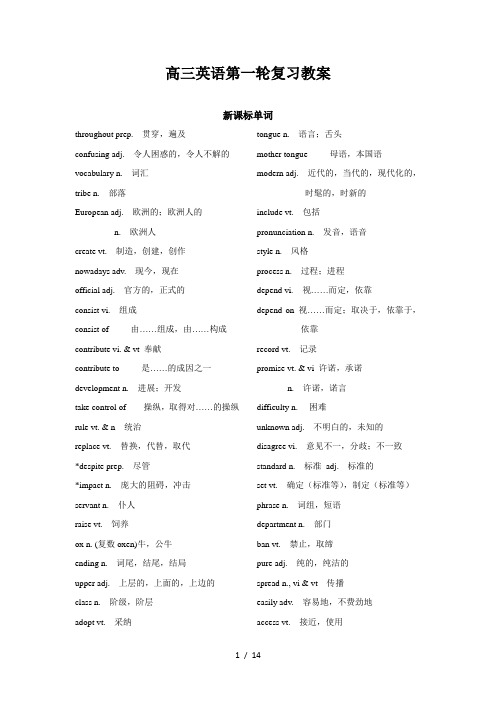
高三英语第一轮复习教案新课标单词throughout prep. 贯穿,遍及confusing adj. 令人困惑的,令人不解的vocabulary n. 词汇tribe n. 部落European adj. 欧洲的;欧洲人的n. 欧洲人create vt. 制造,创建,创作nowadays adv. 现今,现在official adj. 官方的,正式的consist vi. 组成consist of 由……组成,由……构成contribute vi. & vt 奉献contribute to 是……的成因之一development n. 进展;开发take control of 操纵,取得对……的操纵rule vt. & n 统治replace vt. 替换,代替,取代*despite prep. 尽管*impact n. 庞大的阻碍,冲击servant n. 仆人raise vt. 饲养ox n. (复数oxen)牛,公牛ending n. 词尾,结尾,结局upper adj. 上层的,上面的,上边的class n. 阶级,阶层adopt vt. 采纳tongue n. 语言;舌头mother tongue 母语,本国语modern adj. 近代的,当代的,现代化的,时髦的,时新的include vt. 包括pronunciation n. 发音,语音style n. 风格process n. 过程;进程depend vi. 视……而定,依靠depend on 视……而定;取决于,依靠于,依靠record vt. 记录promise vt. & vi 许诺,承诺n. 许诺,诺言difficulty n. 困难unknown adj. 不明白的,未知的disagree vi. 意见不一,分歧;不一致standard n. 标准adj. 标准的set vt. 确定(标准等),制定(标准等)phrase n. 词组,短语department n. 部门ban vt. 禁止,取缔pure adj. 纯的,纯洁的spread n., vi & vt 传播easily adv. 容易地,不费劲地access vt. 接近,使用n 接近的机会,享用权across prep. 在……各处,遍及racial adj. 种族的character n. (书写或印刷)符号Chinese character 汉字differ vi. 相异,有区别differ from 和……不同,不同于represent vt. 代表action n. 行为,动作,行动combine vt. & vi 组合,(使)联合,(使)结合writing n. 文字;文字作品drawing n. 绘画,绘画艺术physical adj. 有形的;实物的;物质的square adj. 方的,正方形的n. 方型,正方形simplify vt. 简化complex adj. 复杂的originally adv. 最初,原先,起先eventually adv. 最后,终于,最终reflect vt. 反映,反射prisoner n. 囚犯symbol n. 符号;象征direction n. 方向opposite n. 相反的事物,相对立的事物indicate vt. 显示,表示,象征,暗示pronounce vt. 发音课文显现短语1. in a sense2. stand for3. all over the world4. inform sb of sth5. throughout history6. be made up of7. bring sb with sth8. speak a language9. be different from10. consist of11. the official language12. find it hard to do sth13. contribute to14. take control of 15. be replaced with/by16. even though17. despite the fact18. have an impact on19. the English language20. result in21. work as22. the way of doing sth23. because of24. depend on25. quite a few26. make up27. have a word with sb28. a six-year-old kid29. right away30. take action31. look forward to (doing) sth32. a waste of time33. leave out34. in any case35. come true36. look up37. used to do sth38. care about39. at one time40. due to41. get to the point42. waste time doing sht.43. make fun of44. be used to do sth45. in addition46. in a word47. it seems likely that 48. sb is likely to do sth49. concentrate on50. in a short51. a written/spoken language52. differ from…in…53. as a whole54. develop into55. combine…together56. in the 1950s57. be widely used一.单词应用依照单词的首字母或汉语意思填写正确单词,注意形式变化。
(新课标)2020高考英语一轮总复习第1部分Book1Unit2Growingpains教案(含解析)牛津译林版
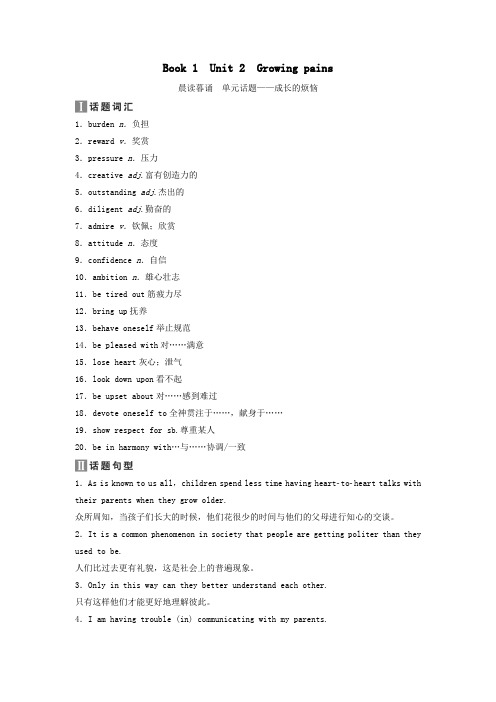
Book 1 Unit 2 Growing pains晨读暮诵单元话题——成长的烦恼1.burden n.负担2.reward v.奖赏3.pressure n.压力4.creative adj.富有创造力的5.outstanding adj.杰出的6.diligent adj.勤奋的7.admire v.钦佩;欣赏8.attitude n.态度9.confidence n.自信10.ambition n.雄心壮志11.be tired out筋疲力尽12.bring up抚养13.behave oneself举止规范14.be pleased with对……满意15.lose heart灰心;泄气16.look down upon看不起17.be upset about对……感到难过18.devote oneself to全神贯注于……,献身于……19.show respect for sb.尊重某人20.be in harmony with…与……协调/一致1.As is known to us all,children spend less time having hearttoheart talks with their parents when they grow older.众所周知,当孩子们长大的时候,他们花很少的时间与他们的父母进行知心的交谈。
2.It is a common phenomenon in society that people are getting politer than they used to be.人们比过去更有礼貌,这是社会上的普遍现象。
3.Only in this way can they better understand each other.只有这样他们才能更好地理解彼此。
4.I am having trouble (in) communicating with my parents.我与父母在沟通上遇到了麻烦。
高三英语第一轮复习高一Unit20课件 新课标 人教版

2. certain adj.确定的;无疑的;某(种)
• There is no certain cure for this illness. • There are certain laws about drinking and driving. • certainly adv.确定地;无疑地 • certainty n.确定; 铁定的事实 • make certain 弄清楚 • be certain to do sth.肯定干某事 • be certain of/ about sth.确保某事 • It is certain that…某事是真的 • Sb. is certain that…某人确信某事是真的
(3).和too, more than 连用时, almost • (4).被 very, pretty , not 等修饰时,用nearly.
• Practice: • 1 . Almost _______ no one believe him. almost • 2.The speaker said _______ nothing worth listening. A • 3._______ none of the students know about it. • Frankly speaking, I don’t _____ know about it • either. • A. Almost , nearly B. Nearly, mostly • C. Almost, almost D. Nearly , nearly
• • • • • • • • • •
rapid; fast; quick 三者都有 “快的,迅速的”意思 rapid侧重于运动本身,隐含速度快得出人意料 Fast 侧重于速度快 quick强调迅速、敏捷、或持续时间短 rapid progress in English study. 1. He has made ______ _____ Fast reading was one of the courses I liked in college. quick 2. All the interviewees are required to give a ____ answer to the question. C recovery from his 3. Unexpectedly, he had a _____ illness.(2004 百校联考) • A. fast B. quick C. rapid D. soon
高三英语复习教案高一部分Unit1-20
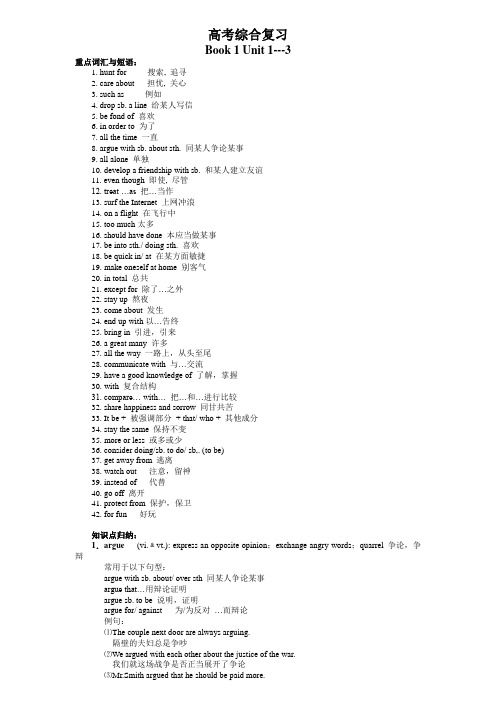
高考综合复习Book 1 Unit 1---3重点词汇与短语:1. hunt for 搜索, 追寻2. care about 担忧, 关心3. such as 例如4. drop sb. a line 给某人写信5. be fond of 喜欢6. in order to 为了7. all the time 一直8. argue with sb. about sth. 同某人争论某事9. all alone 单独10. develop a friendship with sb. 和某人建立友谊11. even though 即使, 尽管12. treat …as 把…当作13. surf the Internet 上网冲浪14. on a flight 在飞行中15. too much太多16. should have done 本应当做某事17. be into sth./ doing sth. 喜欢18. be quick in/ at 在某方面敏捷19. make oneself at home 别客气20. in total 总共21. except for 除了…之外22. stay up 熬夜23. come about 发生24. end up with以…告终25. bring in 引进,引来26. a great many 许多27. all the way 一路上,从头至尾28. communicate with 与…交流29. have a good knowledge of 了解,掌握30. with 复合结构31. compare… with… 把…和…进行比较32. share happiness and sorrow 同甘共苦33. It be + 被强调部分+ that/ who + 其他成分34. stay the same 保持不变35. more or less 或多或少36. consider doing/sb. to do/ sb,. (to be)37. get away from 逃离38. watch out注意,留神39. instead of代替40. go off 离开41. protect from 保护,保卫42. for fun好玩知识点归纳:1.argue(vi.﹠vt.): express an opposite opinion;exchange angry words;quarrel 争论,争辩常用于以下句型:argue with sb. about/ over sth 同某人争论某事argue that…用辩论证明argue sb. to be 说明,证明argue for/ against为/为反对…而辩论例句:⑴The couple next door are always arguing.隔壁的夫妇总是争吵⑵We argued with each other about the justice of the war.我们就这场战争是否正当展开了争论⑶Mr.Smith argued that he should be paid more.史密斯先生据理力争他应得到更多的工薪⑷The way he spends money argues him to be rich.他花钱的方式说明他很富有⑸His accent argues him to be a southerner.他的口音说明他是个南方人⑹He argues that the experiment could be done in another way.他论证说这项实验可以换一种方法进行⑺The workers argued for the right to strike.工人们为争取罢工的权利而辩论* argument(n.) 争论,论据,论点⑴They got into quite a heated argument.他们的争论到达了白热化。
- 1、下载文档前请自行甄别文档内容的完整性,平台不提供额外的编辑、内容补充、找答案等附加服务。
- 2、"仅部分预览"的文档,不可在线预览部分如存在完整性等问题,可反馈申请退款(可完整预览的文档不适用该条件!)。
- 3、如文档侵犯您的权益,请联系客服反馈,我们会尽快为您处理(人工客服工作时间:9:00-18:30)。
Unit 20 Humour⊕考纲要求:◆考纲规定的考试范围:1. 重点单词与短语humour; humourous; bitter; chalk; couple; minister; circus; intend; stage;nationality; certain; amuse; laughter; accent; actually; typical; tradition; rapid; appreciate;exist; phrase; suffer; operate; direction; brake; cyclist; fortunately; bicycle; silence; rude;confuse; confused;make fun of; date back; make use of; drive off; be on good terms with sb.;look on… as; take notes of; stand for; go against; year after year; in the direction of; insurprise; to one’s joy句型The actors make us laugh by making fun of somebody’s way of dressing or telling an amusing story. v-ing 做定语I remember that the last time we met I did most of the talking, so perhaps I should let you do the talking this time. the last time引导时间状语从句。
语法:The v-ing Form as Attribute and Complement◆复习本章要达到的目标1. 掌握bitter; couple; intend; stage; certain; amuse; accent; actually; typical; tradition;appreciate; exist; suffer; operate; direction; fortunately; silence; rude; confuse; confused;make fun of; date back; make use of; drive off; be on good terms with sb.; look on… as; take notes of; stand for; go against; year after year; in the direction of; in surprise; to one’s joy等重点单词及短语的用法。
2. 掌握v-ing 做定语的用法;the last time引导时间状语从句的用法和现在分词作宾补的用法。
⊕教材知识归纳◆知识归纳I would like to reach a wide audience, tough I mostly have adults in mind.mind的用法:构词:evil-minded 存心不良的low-minded 卑鄙的small-minded 气量小的strong-minded 意志坚强的absent-minded 心不在焉地知识梳理:(1)n. ①头脑,智力He has a brilliant mind.他智力超群。
②记忆力It completely slipped my mind.对此,我一点也记不起来了。
③意向He has a good mind to quit that job.他很想辞去那份工作。
④主意;意见,想法Two days later he changed his mind.两天后他改变主意了。
⑤精神,心I have your safety in mind.我记挂着你的安全。
(2)vt.①注意,留意Mind the wet paint.当心油漆未干。
Mind your head,当心你的头。
②(用于否定句和疑问句中)介意,反对Do you mind if I put my bag here?我把袋子放在这儿你不介意吧?Would you mind switching the television to channel 8?请把电视转到八频道好吗?She wouldn't mind taking care of our children.她不会介意照料我们的孩子的。
③照料,看管Your son can mind your shop for you.你儿子可以替你照管商店。
(3)vi. 介意If you don't mind I'll open the window.如果你不介意,我就开窗。
相关归纳:(1)never mind 别难过;没关系;不重要Sorry to have kept you waiting so long.非常抱歉让你等了那么久。
Never mind. 没关系。
(2)be in / have a good mind to do sth 极想,极有意I have a good mind to see you.我极其想见到你。
(3)be of / in a / one mind 意见一致As to where to spend the holiday, we are of a mind.对于去那里度假,我们意见一致。
(4)be out of one's mind 精神不正常,发疯;忘记He must be out of his mind, wearing a jacket on a snowy day.他一定疯了,在下雪的日子里穿一件夹克衫。
(5) bear / keep...in mind 记住,记在心里We should keep it in mind that getting up early is good for health.我们应该记住早起对健康有益处。
(6)bring / call...to one's mind 想起,回忆起The picture brought the childhood to my mind.这张照片使我回忆起了童年。
(7)change one's mind 改变想法/主意;变卦At the last moment, he changed his mind.在最后一刻钟他改变了注意。
(8)come to / into one's mind 浮现在某人的脑海中A good idea came to my mind.我相出了一个好主意。
(9)make up one's mind 决心,打定主意;接受,承认I made up to catch the early bus.我下决心要赶上早班车。
2. The actors make us laugh by making fun of somebody’s way of dressing or telling an amusingstory.amuse vt. 给……娱乐(消遣); 使……喜欢(高兴); 逗……乐(笑)派生词:amusement n. 娱乐;消遣;娱乐活动amused adj. 愉快的;开心的;好玩的amusing adj. 有趣的相关归纳:(1)amuse oneself with 以……自娱(2)be amused at/by/with 以……为乐;对……觉得有趣(好笑)(3)be amused to do sth. 做……取乐I was very much amused to see the seal perform its tricks.看见海豹表演技巧我感到很高兴。
The children amused themselves by playing hide-and- seek games.孩子们玩捉迷藏游戏取乐。
3.what do you intend to do?intend:vt意欲,打算; 原本是要……;原意要……派生词:intending adj. 预期的;未来的intended adj. 预期的;有意的;已订婚的intention n. 意图,打算,目的;意义,用意intentional adj. 故意的,有意的,存心的intentionally adv. 故意地,有意地相关归纳:(1)intend to do sth/doing sthI’ve made a mistake, though I didn’t intend to/ mean to.我错了,虽然我不愿意。
(2)intend sb. to doHe intends his son to manage the company.他打算让儿子经营公司。
(3)intend that…He intends that the plan should be put into practice within a year. 他有意让这个计划在一年之内付诸实践。
(4)intend sth for sbI intended these flowers for you.我打算把这些花送给你的。
(5)be intended for/ asThis book was intended for you, but he took it away.这本书是要给你的,但让他拿走了。
(6)be intended to doThis was intended to be a picture of a cat.这本应是一张猫的画像。
(7) have no intention of doing…无意做……I have no intention of going to the wedding.我不想去参加婚礼。
(8) with the intention of 抱有……目的,打算He left England with the intention of traveling in France.他离开英国打算去法国旅游。
(9) without intention 无意中,不是故意地He broke the window without intention.他无意之中把玻璃弄碎了。
4.certain 的用法派生词:certainly adv. 的确,(口语)当然·行certainty n. 确实.确定(性);确知,确信相关归纳:(1)It is certain that... ……”是肯定无疑的It is certain that he is honest.他是个诚实的人是确定无疑的。
